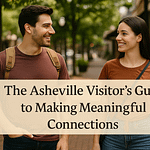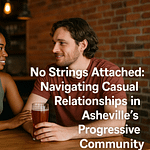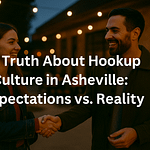Asheville may be nestled in the South, but its social culture defies simple regional stereotypes. This mountain town’s unique blend of Southern hospitality, progressive values, creative energy, and outdoor enthusiasm creates a conversational landscape that follows its own distinct rules. Generic pickup lines and standard small talk that might work elsewhere often fall flat in this community that prizes authenticity and depth over polished performance.
“There’s this immediate authenticity detector that most Asheville locals seem to possess,” explains social anthropologist Dr. Emma Chen, who studies communication patterns in transitional communities. “Generic approaches that might work in Charlotte or Atlanta are often met with polite but minimal engagement here. The community values genuine connection over social scripts.”
After interviewing dozens of longtime residents, relationship experts, and service industry workers who observe social interactions daily, I’ve compiled this guide to conversation approaches that genuinely resonate in Asheville’s unique social environment—whether you’re looking for friendship, romance, or simply meaningful connection.
Understanding Asheville’s Conversational Culture
Before diving into specific conversation starters, it’s essential to understand the underlying values and expectations that shape social interaction in this mountain town.
The Authenticity Premium
“What strikes many newcomers about Asheville’s social scene is how quickly conversations tend to move beyond surface pleasantries,” notes local bartender Jamie, who has observed thousands of first meetings at a popular West Asheville establishment. “There’s less patience for the standard ‘what do you do?’ exchange that dominates in more career-focused cities.”
This authenticity orientation manifests in several ways:
- Value-forward communication: Conversations often reveal personal values early, rather than keeping them hidden until deeper acquaintance.
- Comfort with quirk: Unusual interests, non-traditional life choices, and idiosyncratic perspectives are generally welcomed rather than hidden.
- Reduced status signaling: Traditional status markers (job prestige, material possessions) carry less conversational weight than in many other places.
- Experience emphasis: Shared experiences and perspectives often take precedence over achievements and acquisitions in establishing connection.
The Community Context
Asheville’s relatively small size creates a conversational ecosystem where community connection matters significantly.
“There’s always this awareness that Asheville is, at its core, a small town where paths cross repeatedly,” explains longtime resident Michael. “This creates a different approach to initial conversations—people tend to establish authentic connection rather than just making momentary impressions.”
This community awareness shapes conversations through:
- Connection-seeking: Questions often aim to find mutual connections or shared community touchpoints.
- Place-based identity: Where you live within Asheville (West Asheville, Montford, River Arts District, etc.) carries significant social meaning.
- Longevity awareness: How long you’ve been in Asheville often shapes conversational dynamics and the types of questions asked.
- Reduced anonymity: The assumption that you might encounter this person again in another context influences conversational depth and authenticity.
Conversation Starters That Resonate in Asheville
With this cultural context in mind, here are conversation approaches that tend to create genuine connection in Asheville’s unique social landscape:
1. Place-Based Conversational Entry Points
Asheville residents often identify strongly with specific neighborhoods and local establishments, creating natural conversation openings around place.
Effective approaches include:
“I just discovered [local establishment]. Do you have other spots in that neighborhood you’d recommend?”
This works because: It establishes that you’re engaged with the local community while inviting their expertise. It also potentially reveals which neighborhood they connect with.
“I’ve been exploring the River Arts District lately. Do you have favorite studios or spots there that might fly under the radar?”
This works because: It shows interest in local art culture (a core Asheville value) while seeking authentic rather than tourist-oriented experiences.
“I’m trying to decide between living in West Asheville or closer to downtown. Do you have thoughts on the different neighborhood vibes?”
This works because: It creates space for them to share local knowledge and perspective while potentially revealing where they live and what they value in community.
2. Value-Revealing Questions
Asheville’s progressive, environmentally-conscious culture means values-oriented conversations feel natural rather than forced or overly serious.
Effective approaches include:
“I’m trying to reduce my environmental footprint and wondering if you have favorite local shops or farmers markets that make that easier?”
This works because: It reveals a value (environmental consciousness) that resonates with many Asheville residents while inviting practical local knowledge sharing.
“I just volunteered with [local organization]. Have you found good ways to get involved in the community here?”
This works because: It demonstrates community engagement while opening space for them to share their own involvement or values around service.
“I love how many independent businesses thrive here compared to where I lived before. Do you have favorites you try to support regularly?”
This works because: It signals appreciation for a widely-shared local value (supporting independent businesses) while inviting personal recommendations.
3. Experience-Oriented Inquiries
Asheville’s culture values experiences over possessions, creating natural conversation around activities and adventures.
Effective approaches include:
“I’m putting together a hiking bucket list for this season. Do you have trails you’d consider unmissable around here?”
This works because: It connects with the strong outdoor culture while giving them an opportunity to share personal experiences rather than just facts.
“This band reminds me of a show I caught at The Grey Eagle last month. Have you discovered any local music spots you particularly enjoy?”
This works because: It establishes connection to local music culture (a core Asheville value) while inviting personal perspective rather than just recommendations.
“I’m trying to develop my [craft/skill] and looking for workshops or classes. Have you explored any of the creative learning opportunities around town?”
This works because: It shows interest in creative development (highly valued in Asheville) while potentially discovering shared interests.
4. Community-Connection Builders
Asheville’s interconnected social web means finding mutual connections or community touchpoints creates immediate rapport.
Effective approaches include:
“I think I saw you at the climate action rally last weekend. Were you involved with organizing that?”
This works because: It establishes a shared value and experience while expressing genuine curiosity about their community involvement.
“Your dog looks exactly like one I always see at the West Asheville Tailgate Market. Do you ever make it to that market?”
This works because: It creates a potential community connection point while opening conversation about a popular local gathering place.
“That [item they’re wearing/carrying/using] looks like it might be from [local shop/artist]. Is it?”
This works because: It demonstrates your local knowledge while potentially discovering a shared appreciation for local creators.
Conversation Approaches to Avoid
Understanding what doesn’t work in Asheville is just as important as knowing effective approaches. Several conversational strategies that might succeed elsewhere often fall flat in this particular community:
1. Generic Compliments
“The standard appearance-based compliment that might work as an opener in other places tends to receive lukewarm response here,” explains dating coach Alex. “Asheville’s culture generally values substance over surface, so purely aesthetic observations without deeper engagement often fail to launch meaningful conversation.”
Instead of: “You have a great smile.”
Try: “That shirt from the [local event/brewery/organization] is awesome. Were you at that event?”
2. Career-Centered Opening Questions
“The ‘what do you do?’ question that dominates in many cities isn’t necessarily taboo here, but it rarely creates the engagement people hope for,” notes social researcher Maya. “Asheville has a significant population that has intentionally chosen lifestyle over career advancement, or who work multiple jobs to support creative pursuits.”
Instead of: “What do you do for work?”
Try: “What keeps you busy these days?” or “What are you passionate about outside of making a living?”
3. Materialistic References
“Conversations that center on luxury experiences, expensive possessions, or status symbols often create distance rather than connection in Asheville,” explains longtime resident Jordan. “There’s a community value around simplicity and experience over consumption that makes such topics less effective for building rapport.”
Instead of: Mentioning the luxury hotel you’re staying at
Try: Sharing an interesting experience you had at a local establishment or natural setting
4. Rushed Romantic Advances
“There’s a pacing expectation in Asheville that differs from both bigger cities and smaller rural towns,” notes relationship coach Tina. “Direct romantic or sexual overtures that might be standard in more anonymous urban environments or more straightforward in rural dating cultures tend to be received poorly here without established connection first.”
Instead of: Direct physical compliments or immediate date proposals
Try: Building authentic connection around shared interests or values before expressing romantic interest
Navigating Different Social Contexts
While these general principles apply broadly, Asheville contains distinct social ecosystems with their own conversational norms. Understanding these contextual differences helps tailor your approach appropriately:
Downtown vs. West Asheville
“Downtown and West Asheville have developed distinct conversational cultures,” explains sociologist Dr. Lee. “Downtown interactions, particularly in tourist-heavy areas, tend to begin with establishing whether someone is local or visiting, while West Asheville conversations often assume locality and move directly to community connections.”
Downtown effective opener: “Are you local to Asheville? I’m trying to find places that aren’t in every tourist guide.”
West Asheville effective opener: “Do you make it to the Tuesday night thing at Isis Music Hall often? I’m trying to become a regular at more community events.”
Outdoor Settings vs. Indoor Venues
Conversations in Asheville’s abundant outdoor recreation spaces follow different patterns than those in urban establishments.
“There’s a natural camaraderie on the trails that creates easier conversation openings than in more structured indoor environments,” notes hiking guide Elena. “Simple observations about the shared experience often open doors to deeper connection in outdoor contexts.”
Trail/outdoor effective opener: “Those [shoes/poles/gear] look perfect for these conditions. Have you tried them on [specific local trail]?”
Indoor venue alternative: “That [book/journal/laptop sticker] caught my eye. Are you involved with [related topic/community]?”
Creative Spaces vs. Conventional Settings
The River Arts District and other creative hubs foster distinct conversational approaches compared to more conventional settings.
“In creative spaces, curiosity about process and inspiration creates natural connection,” explains artist Thomas. “Questions that might seem intrusive elsewhere are welcomed as genuine interest in creative contexts.”
Creative space effective opener: “I’m fascinated by your [medium/approach]. What drew you to working this way?”
Conventional setting alternative: “That’s a really interesting [item they have]. Does it have a story behind it?”
Conversation Evolution: Beyond the Opening
Starting a conversation effectively is just the first step. Asheville’s social culture has distinct patterns for how conversations develop beyond initial exchanges.
The Depth Acceleration
“What often surprises newcomers is how quickly conversations in Asheville can move from casual to substantive,” notes psychologist Dr. Kim. “Topics that might be considered ‘too deep’ for initial meetings elsewhere—values, life philosophy, emotional experiences—often emerge naturally and early here.”
This depth acceleration is most successful when:
- It follows genuine points of connection rather than feeling forced
- It remains conversational rather than confrontational about differences
- It includes personal experience rather than just abstract opinion
- It maintains lightness and humor alongside depth
The Community Weaving
Conversations in Asheville often include an element of community connection that extends beyond the immediate interaction.
“There’s almost always this moment where people start actively making connections beyond themselves,” explains community organizer Leah. “‘Oh, you should meet my friend who also does that’ or ‘There’s this group that gets together around that interest’ is a standard and genuine part of conversation flow here.”
This community weaving is most natural when:
- It follows established points of genuine connection
- It’s specific rather than vague (“You should meet Jordan who organizes the Tuesday thing” rather than “You should meet my friends sometime”)
- It includes context for why the connection would be valuable
- It offers a concrete pathway to the suggested connection
Practical Application: Putting It All Together
To illustrate how these principles work in practice, here are some real-world examples of conversation progressions that created meaningful connection in different Asheville contexts:
Farmers Market Scenario
Opening: “Those mushrooms look amazing. Do you have a favorite way to prepare them?”
Response: Brief recommendation and mention of cooking classes they’ve taken locally
Evolution: “I’ve been wanting to take cooking classes here. Was that at Asheville Mountain Kitchen? I’ve heard good things about their seasonal approach.”
Community weaving: Discussion of local food scene leads to mention of community dinner they help organize monthly
Connection outcome: Invitation to attend next community dinner event
This worked because: It began with genuine interest in a shared activity (cooking local food), established local knowledge and values alignment, and created a natural pathway to further in-person connection.
Brewery Scenario
Opening: “That book you’re reading looks interesting. I don’t often see people reading [specific genre/author] in breweries.”
Response: Brief description of the book and mention that they’re in a local book club
Evolution: “I’ve been looking for a good book club since I moved to North Asheville. Is yours open to new members or more established?”
Depth development: Conversation shifts to what they value in literary discussion and community
Connection outcome: Exchange of contact information to share book club details
This worked because: It showed observation beyond the obvious, demonstrated shared interest, and explored values around community and intellectual engagement in a natural progression.
Hiking Trail Scenario
Opening: “Those mountains never get old, do they? Do you have a favorite season to hike this trail?”
Response: Sharing preference for fall hiking and mentioning specific color changes they look forward to
Evolution: “I’m still learning the best time to catch peak colors here. Last year I was a few weeks too late for the higher elevations. Have you lived here long enough to predict it?”
Depth development: Conversation expands to changes they’ve both observed in the environment and community over time
Connection outcome: Spontaneous continuation of hike together and exchange of contact information
This worked because: It established shared appreciation for the natural environment (a core Asheville value), created space for local knowledge sharing, and allowed natural evolution to deeper topics.
Finding Your Authentic Approach
While understanding these local conversational patterns is helpful, relationship experts emphasize that authenticity remains the most important factor in creating meaningful connection in Asheville.
“The specific words matter less than the genuine curiosity and presence behind them,” explains relationship coach Maya. “Asheville’s culture doesn’t require you to be someone you’re not—in fact, it specifically rewards you for being genuinely yourself, just with awareness of local values and communication styles.”
For those navigating Asheville’s social landscape, the most successful approach combines:
- Genuine curiosity about the specific person and their experiences
- Awareness of local values without forced performance of them
- Comfort with conversation that blends lightness and depth
- Openness to community connection beyond the immediate interaction
By understanding and working with Asheville’s unique conversational culture rather than against it, you’ll find that meaningful connections develop with a naturalness that might surprise you—whether you’re seeking friendship, romance, or simply rich social engagement in this distinctive mountain community.
For more insights into finding your people in Asheville’s diverse social landscape, check out our companion article “Beyond Breweries: Unexpected Places to Meet Singles in Asheville” to discover gathering spots aligned with your authentic interests and communication style.



